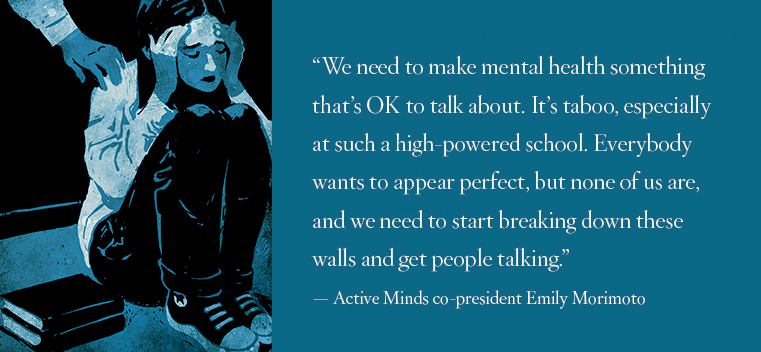
Creating a Safe Space
Tell us what you think. E-mail comments or questions to the editors at letters@northwestern.edu.
Ever wonder about those strange designations we use throughout Northwestern to identify alumni of the various schools of the University? See the complete list.
Find Us on Social Media
Awareness about mental health issues grows.
At the end of a week of high-energy orientation programming, the class of 2017 headed to Welsh-Ryan Arena on the Sunday night of Wildcat Welcome for a serious conversation. Jordan Burnham, an outgoing and inspiring young man who survived a jump from a ninth-story window, talked openly about his suicide attempt and his battle with depression.
His message: among all the responsibilities that come with college, the biggest is to take care of your mental health. When he finished, the more than 2,100 freshmen and transfer students gave him a rousing standing ovation.
The student-initiated event, funded with a gift from the parents of a Northwestern student, was the first “Essential NU” orientation program focused on mental health, organized to introduce the incoming students to the University’s Counseling and Psychological Services and other resources on campus.
“We kept getting feedback that students didn’t know about CAPS. They didn’t know that there was a place to go,” says John Dunkle, who has worked at Northwestern for 18 years, including eight as executive director of CAPS. “Now no incoming student will be able to say that they don’t know about CAPS.”
Mental health is a growing area of emphasis at Northwestern and on college campuses across the country. The University community dealt with the deaths of three undergraduate students last year, including two by suicide.
“The students were shaken up by these very visible losses,” says Patricia Telles-Irvin, Northwestern’s vice president for student affairs. “They wanted to see more done around mental health issues.”
The number of students coming to CAPS for counseling has increased by more than 14 percent in the past three years, Dunkle says. More than 2,100 students — nearly 13 percent of the entire student body — accessed CAPS’s clinical services in the 2012–13 academic year, and last year the department responded to more than 2,300 third-party calls of concern about students. Northwestern therapists, Telles-Irvin says, saved the lives of more than 60 seriously depressed students last year.
To answer the increasing demand for counseling services, CAPS recently added three new therapists to focus on the needs of student-athletes and Latino students and coordinate the Question-Persuade-Refer Suicide Prevention Gatekeeper Training Program. The new therapists bring the ratio of CAPS staff to students down under 1 to 1,000, closer to the average ratio at Northwestern’s peer institutions.
Northwestern launched its QPR program in March 2012 after a gift from alumni donors. More than 1,500 faculty, students and staff — including all human resources staff, community assistants, peer advisers, ASG senators and first-year Feinberg School of Medicine students — have been trained in the technique.
In addition to its counseling services, CAPS also provides education and outreach events on issues such as body awareness, social anxiety and sleep hygiene. It also runs a popular stress-management drop-in clinic, where students can listen to meditation music in comfortable egg-shaped chairs and learn relaxation techniques.
Dunkle is working with the Associated Student Government on a Campus Coalition on Mental Health, which also includes the Northwestern chapter of Active Minds, a student organization that serves as a student voice on mental health, and NU Listens, a peer listening group. The campus coalition plans to collaborate on two events per quarter focused on mental health.
“We need to make mental health something that’s OK to talk about,” says Active Minds co-president Emily Morimoto, a senior who has struggled with depression. “It’s taboo, especially at such a high-powered school. Everybody’s ambitious. Everybody wants to appear perfect, but none of us are, and we need to start breaking down these walls and get people talking.”
These initiatives complement student affairs’ efforts to create a safety net for students with mental health concerns.
“When it comes to mental health, it’s a campus issue,” says Telles-Irvin, a licensed psychologist. “I want to send a message out to faculty, to staff, to administrators, to students that we’re all here to help each other, and we need to be looking out for those who seem to be struggling or those who are becoming more isolated. I want us all to heighten our awareness.”



 Facebook
Facebook Twitter
Twitter Email
Email


